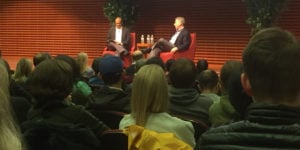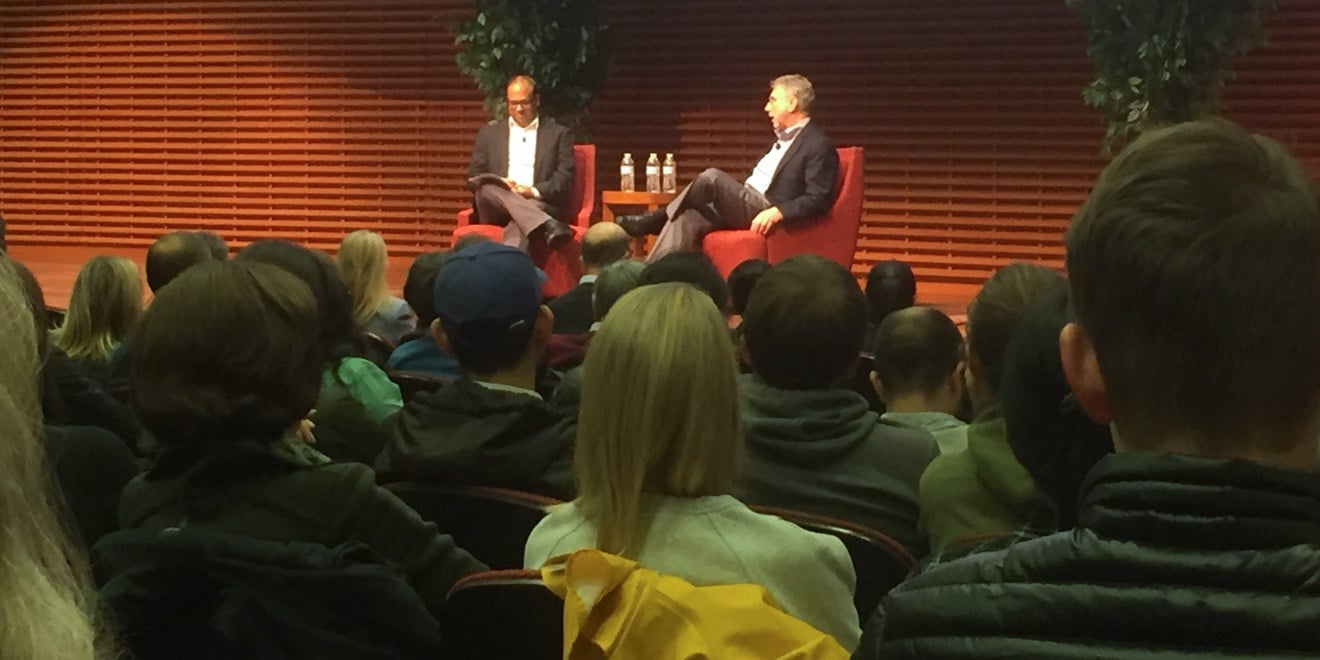Marty Baron, executive editor of The Washington Post, spoke at CEMEX Auditorium on Tuesday about challenges facing journalists, the importance of investigative reporting and the role of technology in journalism today.
Baron worked for several major newspapers before joining The Post in 2013 and is well known for leading a Pulitzer Prize-winning investigative team called Spotlight at The Boston Globe. Spotlight, now the subject of an Oscar-winning film, broke a church abuse scandal in which priests who took sexual advantage of children were allowed to continue practicing within the Boston archdiocese.

Tuesday’s event featured Baron in conversation with Maneesh Agrawala ’94 Ph.D. ’02, Forest Baskett Professor in the School of Engineering and director of the Brown Institute for Media Innovation, about the erosion of trust in the media.
“The president [has] called the media the enemy of the American people,” Baron said. “It’s disturbing that someone in that kind of position can say something like that. [But] our mission is to keep doing our job, no matter what anybody says or what the president says.”
Baron and Agrawala discussed fake news — a growing phenomenon and hot topic of late, especially during the election cycle. A BuzzFeed poll found that most Americans believe the fake news sources in their Facebook feed and share these articles with their friends and family members.
“We have serious issues in our democracy at the moment, such as fake news, and we have to learn how to deal with that,” Baron said.
Baron said The Post must learn how to make people see alternative perspectives that are outside of their “echo chamber.” Although technology helps journalists reach the public faster and disseminate information on digital platforms, he said, traditional forms of journalism are still needed.
“We need to listen to everybody, and our [goal] is to be better listeners,” Baron argued. “We [need] reporters to go up and talk to people and interview sources in person.”
The Post has, however, sought to better integrate technology into its newsroom. Instruments such as The Fact Checker and a database of 2015 fatal police shootings are just a few of the projects the newspaper is working on to, as Baron said, hold people accountable.
But holding people accountable through investigative reporting is no easy task, Baron admitted, and journalists often face financial and technical challenges.
“We need money and time, and both are in short supply today,” he explained. “[But] if we didn’t do investigative reporting, the public wouldn’t forgive us, and nor should they.”
Baron and Agrawala discussed the overlap between investigative reporting and technology with the example of David Fahrenthold, a Post journalist who leveraged social media in his extensive investigation into Donald Trump’s charitable foundation.
Using Twitter, Fahrenthold asked the Internet to help him track down a six-foot portrait that Trump bought using money from his foundation. The Internet answered, and journalists took note; Baron said The Post is mulling over how to use the tactic in future reporting.
“[Fahrenthold] used the public as an investigative tool,” Baron said, laughing. “No one has done that before, but now [the Post] is seeing how we can use that more often.”
Baron said that, although technology offers novel and exciting ways to deliver the news, the foundation of journalism remains the same: accurate and honest reporting.
“My job is to deliver people the facts and do it in a honest, fair and independent way, independent of any party or ideology,” Baron said. “We have to get information that’s not public, and that’s hard, [but] we continue to do all the work we can do.”
Contact Aparna Verma at averma2 ‘at’ stanford.edu.
